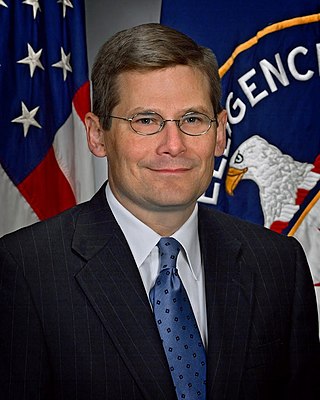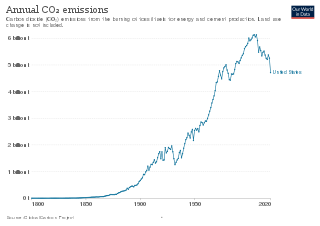
Stephen Martin Walt is an American political scientist currently serving as the Robert and Renee Belfer Professor of international relations at the Harvard Kennedy School.
Imperial presidency is a term applied to the modern presidency of the United States. It became popular in the 1960s and served as the title of a 1973 book by historian Arthur M. Schlesinger, Jr., who wrote The Imperial Presidency to address two concerns: that the presidency was uncontrollable and that it had exceeded its constitutional limits. According to professor of political science Thomas E. Cronin, author of The State of the Presidency, "imperial presidency" is a term used to define a danger to the American constitutional system by allowing presidents to create and abuse presidential prerogatives during national emergencies. This was based on: (1) presidential war powers vaguely defined in the Constitution, and (2) secrecy – a system used that shielded the Presidency from the usual checks and balances afforded by the legislative and judicial branches.
A United States presidential doctrine comprises the key goals, attitudes, or stances for United States foreign affairs outlined by a president. Most presidential doctrines are related to the Cold War. Though many U.S. presidents had themes related to their handling of foreign policy, the term doctrine generally applies to presidents such as James Monroe, Harry S. Truman, Richard Nixon, Jimmy Carter and Ronald Reagan, all of whom had doctrines which more completely characterized their foreign policy.

The Special Relationship is a term that is often used to describe the political, social, diplomatic, cultural, economic, legal, environmental, religious, military and historic relations between the United Kingdom and the United States or its political leaders. The term first came into popular usage after it was used in a 1946 speech by former British Prime Minister Winston Churchill. Both nations have been close allies during many conflicts in the 20th and the 21st centuries, including World War I, World War II, the Korean War, the Cold War, the Gulf War and the war on terror.
Grand strategy or high strategy is a state's strategy of how means can be used to advance and achieve national interests in the long-term. Issues of grand strategy typically include the choice of military doctrine, force structure and alliances, as well as economic relations, diplomatic behavior, and methods to extract or mobilize resources.
Michael F. Scheuer, is an American former intelligence officer for the Central Intelligence Agency, blogger, author, commentator and former adjunct professor at Georgetown University's Center for Peace and Security Studies. One assignment during his 22-year career was serving as Chief of the Bin Laden Issue Station from 1996 to 1999. He also served as Special Advisor to the Chief of Alec Station from September 2001 to November 2004.

In political studies, surveys have been conducted in order to construct historical rankings of the success of the presidents of the United States. Ranking systems are usually based on surveys of academic historians and political scientists or popular opinion. The scholarly rankings focus on presidential achievements, leadership qualities, failures, and faults. Popular-opinion polls typically focus on recent or well-known presidents.

Walter Russell Mead is an American academic. He is the James Clarke Chace Professor of Foreign Affairs and Humanities at Bard College and taught American foreign policy at Yale University. He was also the editor-at-large of The American Interest magazine. Mead is a columnist for The Wall Street Journal, a scholar at the Hudson Institute, and a book reviewer for Foreign Affairs, the bimonthly foreign policy journal published by the Council on Foreign Relations.
Offshore balancing is a strategic concept used in realist analysis in international relations. It describes a strategy in which a great power uses favored regional powers to check the rise of potentially-hostile powers. This strategy stands in contrast to the dominant grand strategy in the United States, liberal hegemony. Offshore balancing calls for the United States to withdraw from onshore positions and focus its offshore capabilities on the three key geopolitical regions of the world: Europe, the Persian Gulf, and Northeast Asia.
The term liberal hawk refers to a politically liberal person who supports a hawkish, interventionist foreign policy.

Michael Joseph Morell is an American former career intelligence analyst. He served as the deputy director of the Central Intelligence Agency from 2010 to 2013 and twice as its acting director, first in 2011 and then from 2012 to 2013. He also serves as a professor at the George Mason University - Schar School of Policy and Government.

The environmental policy of the United States is a federal governmental action to regulate activities that have an environmental impact in the United States. The goal of environmental policy is to protect the environment for future generations while interfering as little as possible with the efficiency of commerce or the liberty of the people and to limit inequity in who is burdened with environmental costs. As his first official act bringing in the 1970s, President Richard Nixon signed the U.S. National Environmental Policy Act (NEPA) into law on New Year's Day, 1970. Also in the same year, America began celebrating Earth Day, which has been called "the big bang of U.S. environmental politics, launching the country on a sweeping social learning curve about ecological management never before experienced or attempted in any other nation." NEPA established a comprehensive US national environmental policy and created the requirement to prepare an environmental impact statement for "major federal actions significantly affecting the quality of the environment." Author and consultant Charles H. Eccleston has called NEPA the world's "environmental Magna Carta".

Thomas Edward Donilon is an American lawyer, business executive, and former government official who served as the 22nd National Security Advisor in the Obama administration from 2010 to 2013. Donilon also worked in the Carter and Clinton administrations. He is now Chairman of the BlackRock Investment Institute, the firm's global think tank.
In international relations, the term smart power refers to the combination of hard power and soft power strategies. It is defined by the Center for Strategic and International Studies as "an approach that underscores the necessity of a strong military, but also invests heavily in alliances, partnerships, and institutions of all levels to expand one's influence and establish legitimacy of one's action."
U.S. President Barack Obama's East Asia Strategy (2009–2017), also known as the Pivot to Asia, represented a significant shift in the foreign policy of the United States since the 2010s. It shifted the country's focus away from the Middle Eastern and European sphere and allowed it to invest heavily and build relationships in East Asian and Southeast Asian countries, especially countries which are in close proximity to the People's Republic of China (PRC) either economically, geographically or politically to counter its rise as a rival potential superpower.
The Obama Doctrine is used to describe one or several principles of the foreign policy of U.S. President Barack Obama. In 2015, during an interview with The New York Times, Obama said: "You asked about an Obama doctrine, the doctrine is we will engage, but we preserve all our capabilities".

The Reagan era or the Age of Reagan is a periodization of recent American history used by historians and political observers to emphasize that the conservative "Reagan Revolution" led by President Ronald Reagan in domestic and foreign policy had a lasting impact. It overlaps with what political scientists call the Sixth Party System. Definitions of the Reagan era universally include the 1980s, while more extensive definitions may also include the late 1970s, the 1990s, and even the 2000s. In his 2008 book, The Age of Reagan: A History, 1974–2008, historian and journalist Sean Wilentz argues that Reagan dominated this stretch of American history in the same way that Franklin D. Roosevelt and his New Deal legacy dominated the four decades that preceded it.

The space policy of the United States includes both the making of space policy through the legislative process, and the implementation of that policy in the United States' civilian and military space programs through regulatory agencies. The early history of United States space policy is linked to the US–Soviet Space Race of the 1960s, which gave way to the Space Shuttle program. At the moment, the US space policy is aimed at the exploration of the Moon and the subsequent colonization of Mars.

Gallup was the first polling organization to conduct accurate opinion polling for United States presidential elections. Gallup polling has often been accurate in predicting the outcome of presidential elections and the margin of victory for the winner. However, it missed some close elections: 1948, 1976 and 2004, the popular vote in 2000, and the likely-voter numbers in 2012. The month section in the tables represents the month in which the opinion poll was conducted. D represents the Democratic Party, and R represents the Republican Party. Third parties, such as the Dixiecrats and the Reform Party, were included in some polls.
In political science, triangular diplomacy is a foreign policy of the United States, developed during the Vietnam War (1955–1975) by Henry Kissinger, as a means to manage relations between the contesting communist powers, the Soviet Union and China. Connecting heavily with the correlating policy of linkage, the policy was intended to exploit the ongoing rivalry between the two Communist powers, as a means to strengthen American hegemony and diplomatic interest.










